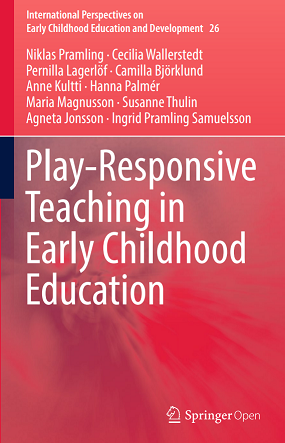
e-BOOK
Play-Responsive Teaching in Early Childhood Education
One of the central problems facing early childhood education is the push down of an academic curriculum. The pressure for the schoolification of play-based settings has become increasingly prevalent in many Northern Hemisphere continents. Sweden – where the content of this book has been conceptualised and studied – is no exception. Despite the Swedish early childhood education system being unrivalled for quality, this country does not appear to be immune to an academic agenda. Consequently, the research problem that has emerged internationally has been the relationship between play and learning. This is conceptualised differently in many southern
countries, mostly because of the need for a more playful curriculum. In these countries, such an approach is thought to contribute to the development of creative and innovative students. Even with differing societal needs globally, the central problem of the relations between play and learning is the same (Fleer and van Oers, 2018). Contemporary play scholars, such as Elena Kravtsova and Bert van Oers, have theorised the problem in different ways: the former drawing upon cultural-historical
theory to conceptualise the transition from play to learning within children’s development and the latter drawing upon activity theory to tease out play activity after
studying pedagogical practices in the early years of school. This theoretical diversity adds to the tapestry of work being done to examine the central problem of the relations between play and learning. This book written by Swedish researchers focused on early childhood education contributes both empirically and theoretically to this central problem. The authors bring to scholarship a serious study and theorisation of what they have conceptualised as play-responsive teaching in early childhood education.
Ketersediaan
| 046 | 372.21 | Website | Tersedia |
Informasi Detail
- Judul Seri
-
-
- No. Panggil
-
372.21
- Penerbit
- Switzerland : Springer., 2019
- Deskripsi Fisik
-
xiii, 183 hlm.
- Bahasa
-
Inggris
- ISBN/ISSN
-
978-3-030-15958-0
- Klasifikasi
-
372.21
- Tipe Isi
-
-
- Tipe Media
-
-
- Tipe Pembawa
-
-
- Edisi
-
-
- Subjek
- Info Detail Spesifik
-
-
- Pernyataan Tanggungjawab
-
Niklas Pramling
Versi lain/terkait
Tidak tersedia versi lain
Lampiran Berkas
Komentar
Anda harus login sebelum memberikan komentar
 Karya Umum
Karya Umum  Filsafat
Filsafat  Agama
Agama  Ilmu-ilmu Sosial
Ilmu-ilmu Sosial  Bahasa
Bahasa  Ilmu-ilmu Murni
Ilmu-ilmu Murni  Ilmu-ilmu Terapan
Ilmu-ilmu Terapan  Kesenian, Hiburan, dan Olahraga
Kesenian, Hiburan, dan Olahraga  Kesusastraan
Kesusastraan  Geografi dan Sejarah
Geografi dan Sejarah